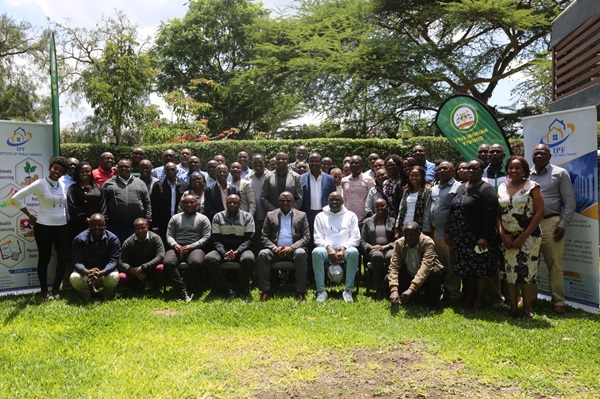Naivasha, 5th April, 2024
H.E Deputy Governor, Njoroge Muchiri officiated a two day revenue technical assistance workshop on potential revenue forecasting conducted by Institute of Public Finance (IPF) led by Head of Research, Ruth Kendagor.
“Revenue anchors a lot on what we, H.E the Governor and I promised the people of Nairobi,” said Deputy Governor, Njoroge Muchiri.
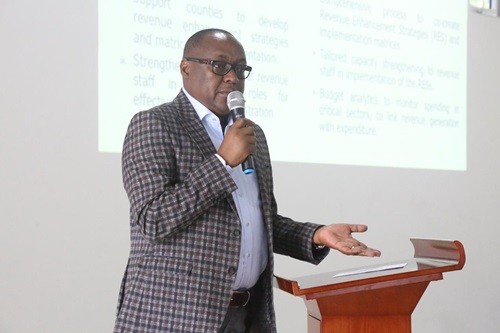 He mentioned that the expectations of the workshop was to come up with a formula that would help in delivering Kshs. 20B as Own Source Revenue (OSR).
He mentioned that the expectations of the workshop was to come up with a formula that would help in delivering Kshs. 20B as Own Source Revenue (OSR).
He said, “Together, we will collectively understand the journey we are on and how to execute the expectations of that journey. As a Government, we made very key and specific commitments to the people of Nairobi with the resources we are collecting such as ; Dishi na County, a school feeding program that we are running in all our schools, building 21 new markets to relocate traders from the streets, addressing the needs of the youth through building stadiums so that they have places to express their energies, ideas and creativity, cleaning the city by not only providing additional equipment but also employing staff, the green army to ensure the City stays clean, revamping health care which is a key service delivery expectation, bringing a city of order and dignity by transforming transportation, road infrastructure and accessibility, creation of 6 boroughs to further decentralize services, increasing volume of water in the city to meet the citizens’ demand, drive the city culture by recognizing the diverse cultures while also promoting the capital of Kenya”.
The Deputy Governor stated that county officers must be very deliberate in service delivery for the Nairobians to feel that the county is really working and they will be compelled to pay for services. “H.E the Governor and I and the cabinet are very much supporting this initiative and we all need to be committed and aligned, work together then we shall fundamentally change the state of Nairobi, the look and feel and people of Nairobi will be proud of even living and working in Nairobi”.
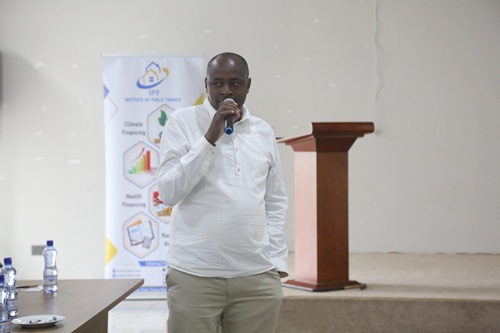 Chief Officer for Revenue Administration, Wilson Gakuya shared that in the County, the fiscal space is limited and there are only three types of revenue raising measures which are equitable shares, conditional grant from partners such as World Bank and County OSR.
Chief Officer for Revenue Administration, Wilson Gakuya shared that in the County, the fiscal space is limited and there are only three types of revenue raising measures which are equitable shares, conditional grant from partners such as World Bank and County OSR.
“Over the years, we have been having challenges in achieving our revenue targets, and the consequences of not hitting our targets is what has translated to pending bills. Looking back at the historical performance we have not met our revenue projections, the highest ever OSR that County has achieved was around Kshs 12B in 2015 but we need to interrogate whether we have unrealistic goals or projections in our revenue”.
Mr. Gakuya stated that with an increase in revenue, H.E., the Governor and Deputy Governor, would be able to achieve promises made to the Nairobians.
He said, “We have initiated a number of reforms within the revenue administration such as establishment of Nairobi Revenue Authority (NRA) to help in revenue mobilization and assist in the management of revenue administration”.
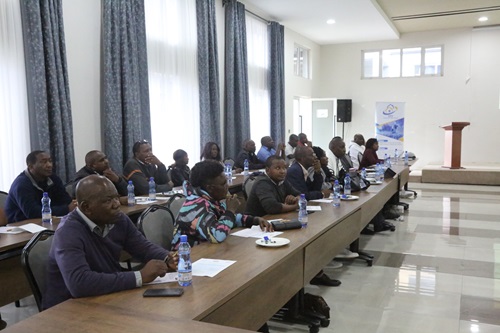 The County additionally introduced Unified Business Permit (UBP) and within the business permit, it has been able to consolidate some of the licenses that have been stand-alone licenses, a move geared towards giving dignity to the Nairobians.
The County additionally introduced Unified Business Permit (UBP) and within the business permit, it has been able to consolidate some of the licenses that have been stand-alone licenses, a move geared towards giving dignity to the Nairobians.
The county is also adopting a multi sectoral approach in compliance and enforcement to encourage clients to self-declare what is due to be paid and officers on the ground will also be able to pinpoint areas of non-compliance without necessarily having to arrest clients.
The Finance and Economic Planning Sector recently concluded validation of schedule of fees and charges with an aim of being transparent in all revenues and charges it levies.
Mr. Gakuya said, “We need to unlock certain bottlenecks around revenue mobilization starting with facilitation. This will ensure that our Sub County Administrators, Ward Administrators, and Sub County Finance Officers work in a coordinated approach and be able to map the various businesses at the ward level. ”
He mentioned that the sectors next undertaking will be to develop a tariff and pricing policy that will see amendment of charges be based on certain parameters. The pricing tariffs policy will enable the county to inform the various charges it undertakes in Nairobi as well as having proper data on allocated spaces.
“We need a stable revenue system for collection though we have seen it is gradually stabilizing. We need a system that can ensure customers can make payment without any hindrances. I appreciate the leadership led by H.E the Governor and Deputy Governor being at the forefront of this conversation and very soon we will be able to domesticate the system so that the county can own its own revenue system and this way, we will also be able to hold every one accountable” he said.
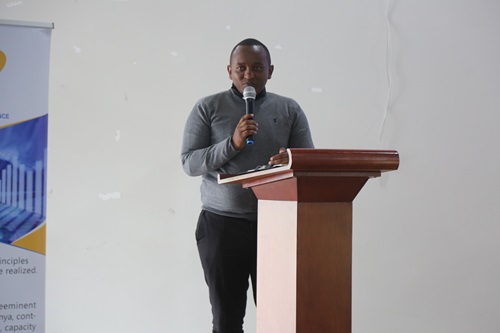 County Chief Officer for Smart Nairobi, Tiras Njoroge, said, “CRA report done concerning OSR is an eye opener for us all. Through that report, looking at Nairobi and how it operates, there is quite a lot that is not being realized. One of the challenges with our county is data silos. We have around 500 data collectors in the sub counties and wards, but the data is not forthcoming. One of the reasons we came up with the revenue system collection is to have visibility of each area and make it easy for analytics to guide us in making decisions. If this data is missing, you find that we keep changing our revenue targets every year, but we change based on the same revenue base without having any way of improving that revenue. ”
County Chief Officer for Smart Nairobi, Tiras Njoroge, said, “CRA report done concerning OSR is an eye opener for us all. Through that report, looking at Nairobi and how it operates, there is quite a lot that is not being realized. One of the challenges with our county is data silos. We have around 500 data collectors in the sub counties and wards, but the data is not forthcoming. One of the reasons we came up with the revenue system collection is to have visibility of each area and make it easy for analytics to guide us in making decisions. If this data is missing, you find that we keep changing our revenue targets every year, but we change based on the same revenue base without having any way of improving that revenue. ”
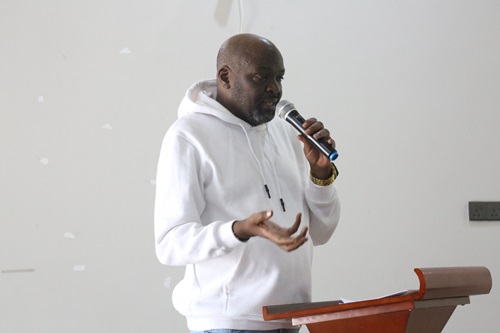 Nairobi Revenue Authority, represented by board member, Shaban Asman, shared that having available data was very important. “In revenue if we could get reports on those who paid for period of January, 2023 vis-a-vis those who paid this year because of the waiver during that period, it will be easy to verify people who paid and those who have not. It is also vital to have a breakdown of specific areas we are doing poorly and improve on in the Unified Business Permit, among other revenue streams as well. ”
Nairobi Revenue Authority, represented by board member, Shaban Asman, shared that having available data was very important. “In revenue if we could get reports on those who paid for period of January, 2023 vis-a-vis those who paid this year because of the waiver during that period, it will be easy to verify people who paid and those who have not. It is also vital to have a breakdown of specific areas we are doing poorly and improve on in the Unified Business Permit, among other revenue streams as well. ”
Institute of Public Finance (IPF) led by Head of Research, Ruth Kendagor took the staff through revenue forecasting approaches, revenue policy strategies, outcomes expected to be seen in revenue policy, OSR enhancement project objectives and approaches among others.
CRA commissioner, Jonas Kuko said “When it comes to OSR, it is up to the County to come up with the solutions and I am glad to see some strategies the team has come up with during their group discussions that if followed through, will raise County’s’ revenue. As CRA, we want to participate and ensure you realize your targets. The CRA report is not a perfect document. It is a moving document that will continuously be improved. Together with IPF, we will all work together in ensuring we clean up your proposals and set realistic targets in the process. ”
Present were heads of major revenue streams, Sub County Finance officers, Sub County Administrators, Ward Administrators among other finance technical officers, CRA Deputy Director Fiscal Affairs, Sally Yagan, Research Officer Revenue enhancement, Zablon Manoah and representatives from Institute of Public Finance.
End/..

